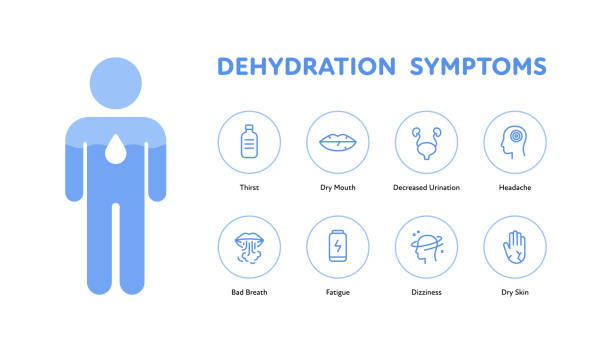Understanding that water constitutes 60-65% of your body weight should be enough to keep downing those eight oz. glasses of water daily. Enough water on board becomes even more critical when you realize that your brain is composed of 70% water, your blood is 80% water, and your lungs are 90% water. Therefore, adequate daily fluid intake is necessary for body systems to work typically or keep working.
Water is essential for all functions in your body. It dissolves and carries nutrients to your cells, maintains the proper balance of chemicals in and around those cells, and collects waste products to be excreted from the body. Water is continuously being removed from your body by sweating, digestion, and waste elimination, so it is essential to replenish it consistently.
All the fluid in your body is provided by what you drink and the foods you eat. The standard recommendation is to drink 48 ounces of water per day. Most people must realize that many solid foods are a significant water source. Fruits and vegetables can contain up to 90% water, and meats contain over 50% water. It’s not all good news about food and fluid intake, though. Some of what you take in will reduce fluid levels rather than increase them. Substances such as the caffeine in coffee act as diuretics and stimulate the body to remove water in the form of urine.
Signs of Dehydration
Dehydration, in simple terms, is a condition that occurs when the body does not have enough fluids. This condition can develop gradually or instead suddenly. It can result from insufficient water intake due to poor hydration habits or excessive water loss due to diarrhea, vomiting, or strenuous exercise. Symptoms of dehydration run the gamut from inconvenient and uncomfortable to severe and life-threatening. Common signs of dehydration are listed below.
- Urine output will be decreased, likely be darker in color, and have a more pungent odor.
- A pinched fold of skin on the back of the hand will not quickly return to its original position because moisture is needed for elasticity.
- Your mouth may feel dry or sticky because fluids get conserved and sent to vital organs.
- Your eyes may feel itchy and scratchy because moisture is not replenished.
- Your joints may feel stiff and ache because lubrication is decreased.
- Muscle cramps may occur due to electrolyte imbalances related to reduced fluids or decreased sodium levels from excessive perspiration.
- A dehydrated brain may lead to confusion, irritability, dizziness, fatigue, and headaches.
- Fluctuations in blood pressure may occur. As blood volume is reduced, blood pressure drops. The body then compensates by producing chemicals constricting blood vessels, causing a rebound rise in blood pressure.

Populations at Risk For Dehydration
Children and babies can become dehydrated very quickly, incredibly when ill. This is because their bodies have a higher percentage of water as body weight, and they metabolize electrolytes more rapidly. Seniors often have a reduced sense of thirst, less ability to conserve water, and are more likely to be on medication such as a diuretic that affects fluid levels. Dehydration is the most frequent reason why seniors are hospitalized. Individuals with chronic illnesses such as kidney disease, cystic fibrosis, diabetes, alcoholism, and adrenal gland disorders are also at higher risk. Also, people who live in high altitudes (>8,000ft) have increased risk because of the way the body adapts to altitude by increasing urine output and increasing respiration (breathing) rate.
Too Much of a Good Thing
Your body can only absorb about one quart of fluid per hour. Therefore, drinking excessive amounts of water in a short period is inefficient and can also be counterproductive or dangerous. Water intoxication occurs when there is too much fluid in the cells and tissues of the body. This can result from drinking too much water, kidney dysfunction, or insufficient elimination of water. Water intoxication can be severe and may result in swelling, confusion, seizures, and even death. For example, college students have been known to die from being forced to drink excessive water during initiation rites.
Tips For Keeping Hydrated
- Do start drinking water early in the day. It is a quick energizer and creates the habit for the day.
- Do drink steadily throughout the day. Large consumption of water could be more efficient. The body can only absorb about one quart of water per hour.
- Adjust your water intake for exceptional circumstances that may decrease hydration, such as sweating during hot days, physical labor, or strenuous exercise.
- Do drink plenty of water after a massage, as toxins can be released and must be flushed from your system.
- Be sure to drink before you are thirsty. When you feel thirsty, you are already in the early stages of dehydration.
- Only drink a little coffee or caffeinated sodas. They act as diuretics and remove more fluid than they provide.
- Don’t drink excessive amounts of water. Even drinking two gallons of water daily can flush out needed substances like vitamins and minerals. Excessive water intake can also lead to water intoxication resulting in confusion, seizures, or even death.
Water is the all-important elixir that keeps your body alive. You may be able to live up to 30 days without food, but you will only survive 3 to 5 days without water. Your body uses water for almost every function, from dissolving and transporting valuable nutrients to keeping you free from toxins by eliminating the waste products your body does not need. So do yourself a favor, fill up that glass, and begin the healthy habit of consuming eight glasses of water a day.
Sources:
CDC. “Water and Healthier Drinks.” Centers for Disease Control and Prevention, 12 Jan. 2021, www.cdc.gov/healthyweight/healthy_eating/water-and-healthier-drinks.html#:~:text=Water%20helps%20your%20body%3A.
NHS inform. “Dehydration Symptoms and Treatments.” Nhsinform.scot, 2019, www.nhsinform.scot/illnesses-and-conditions/nutritional/dehydration.
